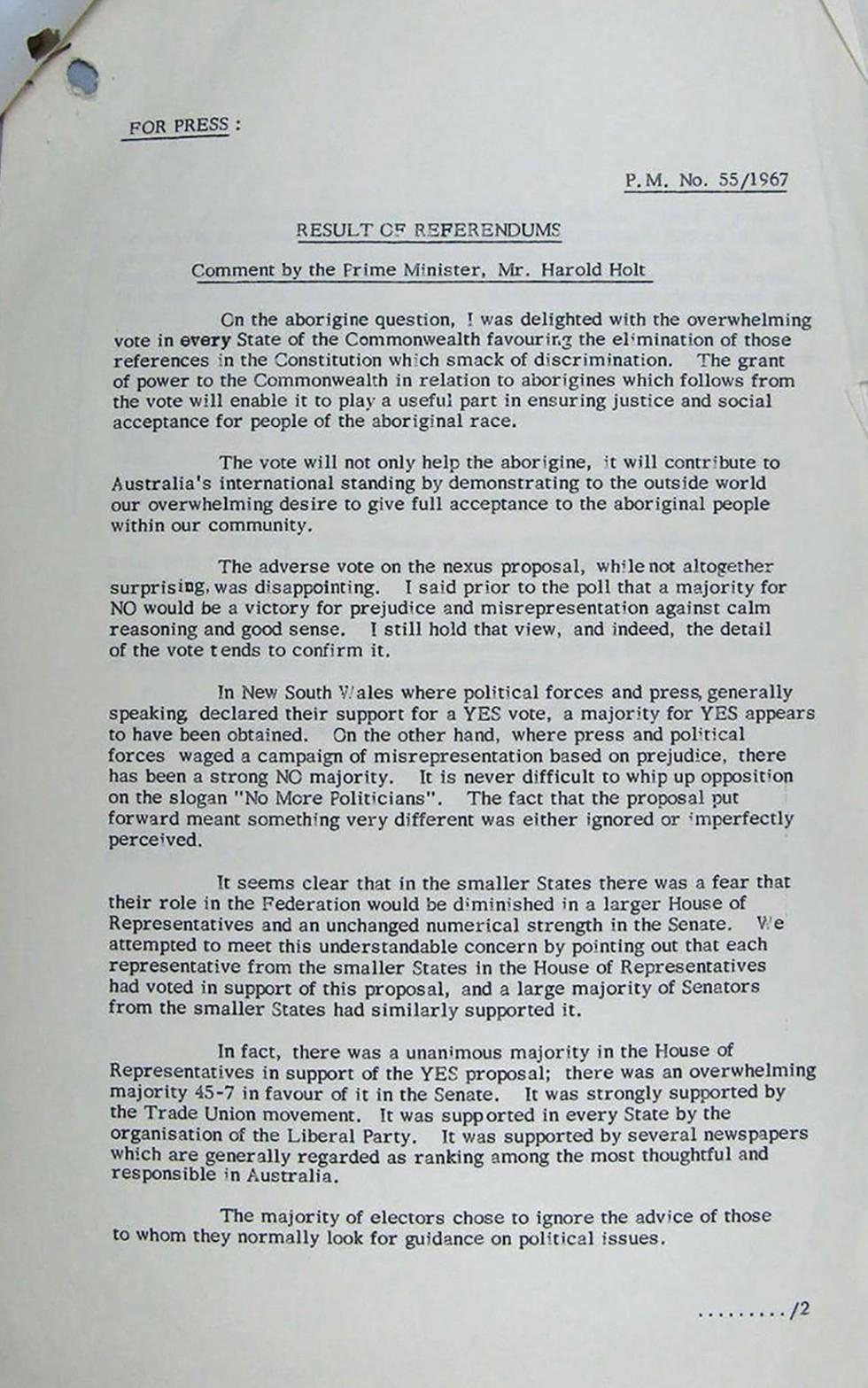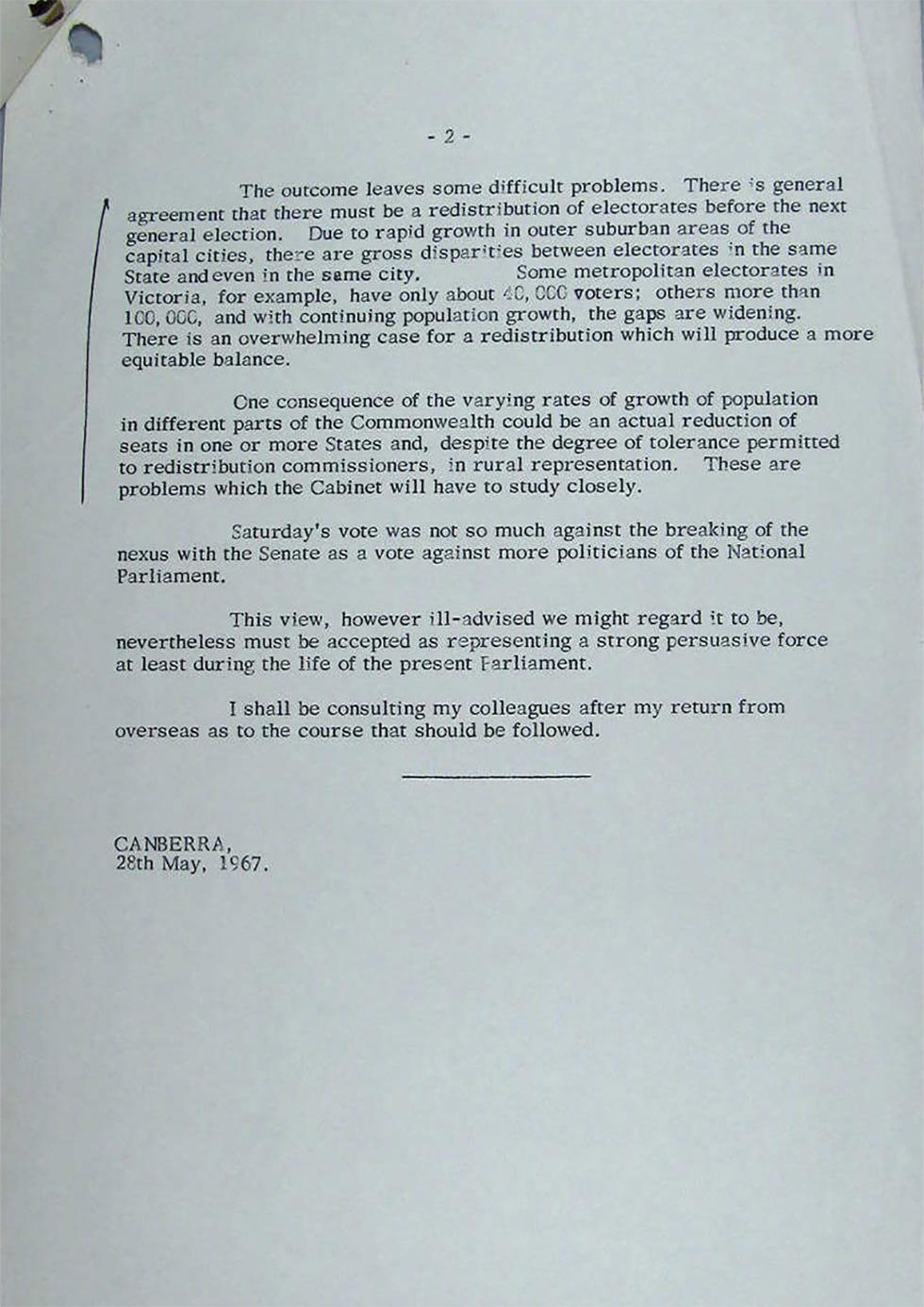
A speech made by Prime Minister Harold Holt on 28 May 1967, in response to Referendum results - page 1.

A speech made by Prime Minister Harold Holt on 28 May 1967, in response to Referendum results - page 2.
Aboriginal and Torres Strait Islander people should be aware that the National Archives' website and collection contain the names, images and voices of people who have died.
Some records include terms and views that are not appropriate today. They reflect the period in which they were created and are not the views of the National Archives.


A speech made by Prime Minister Harold Holt on 28 May 1967, in response to Referendum results - page 1.

A speech made by Prime Minister Harold Holt on 28 May 1967, in response to Referendum results - page 2.
[Page 1]
FOR PRESS:
P.M. No. 55/1967
[Heading] RESULT OF REFERENDUMS
[Subheading] Comment by the Prime Minister, Mr. Harold Holt
On the aborigine question, I was delighted with the overwhelming vote in every State of the Commonwealth favouring the elimination of those references in the Constitution which smack of discrimination. The grant of power to the Commonwealth in relation to aborigines which follows from the vote will enable it to play a useful part in ensuring justice and social acceptance for people of the aboriginal race.
The vote will not only help the aborigine, it will contribute to Australia's international standing by demonstrating to the outside world our overwhelming desire to give full acceptance to the aboriginal people within our community.
The adverse vote on the nexus proposal, while not altogether surprising, was disappointing. I said prior to the poll that a majority for NO would be a victory for prejudice and misrepresentation against calm reasoning and good sense. I still hold that view, and indeed, the detail of the vote tends to confirm it.
In New South Wales where political forces and press, generally speaking, declared their support for a YES vote, a majority for YES appears to have been obtained. On the other hand, where press and political forces waged a campaign of misrepresentation based on prejudice, there has been a strong NO majority. It is never difficult to whip up opposition on the slogan "No More Politicians". The fact that the proposal put forwards meant something very different was either ignored or imperfectly perceived.
It seems clear that in the smaller States there was a fear that their role in the Federation would be diminished in a larger House of Representatives and an unchanged numerical strength in the Senate. We attempted to meet this understandable concern by pointing out that each representative from the smaller States in the House of Representatives had voted in support of this proposal, and a large majority of Senators from the smaller States had had similarly supported it.
In fact, there was a unanimous majority in the House of Representative in support of the YES proposal; there was an overwhelming majority 45-7 in favour of it in Senate. It was supported by several newspapers which are generally regarded as raining among the most thoughtful and responsible in Australia.
The majority of electors chose to ignore the advice of those to whom they normally look for guidance on political issues.
………/2
[Page] -2-
[The following is emphasised by a vertical line added in black ink along the left margin]
The outcome leaves some difficult problems. There is general agreement that there must be a redistribution of electorates before the next general election. Due to rapid growth in outer suburban areas of the capital cities, there are gross disparities between electorates in State and even in the same city. Some metropolitan electorates in Victoria, for example, have only about 40,000 voters; others more than 100,000, and with continuing population growth, the gaps are widening. There is an overwhelming case for a redistribution which will produce a more equitable balance.
One consequence of the varying rates of growth of population in different parts of the Commonwealth could be an actual reduction of seats in one or more States and, despite the degree of tolerance permitted to redistribution commissioners, in rural representation. These are problems which the Cabinet will have to study closely.
[End emphasising line in the margin]
Saturday's vote was not so much against the breaking of the nexus with the Senate as a vote against more politicians of the National Parliament.
This view, however ill-advised we might regard it to be, nevertheless must be accepted as representing a strong persuasive force at least during the life of the present Parliament.
I shall be consulting my colleagues after my return from overseas as to the course that should be followed.
CANBERRA,
28TH May, 1967.
Once the results of a referendum are known, the Prime Minister will sometimes make an address to the nation and make his/her own statement regarding the outcome.
Learn how to interpret primary sources, use our collection and more.
